Abstract
In response to an increased interest in the intersections between health professions and Sociology, the University of Nebraska - Lincoln developed a health focus that offers an array of courses that examine health and society. This specific course encourages a critical examination of health care policy and the health care system using sociological...Download this resource to see full details. Download this resource to see full details.
Details
- Subject Area(s):
- Medical Sociology
- Resource Type(s):
- Syllabus
- Class Level(s):
- College 300
- Class Size(s):
- Medium
Usage Notes
This course was designed to complement a general health, medicine, and society course and a health disparities course that are offered as part of a health focus in the Department of Sociology at the University of Nebraska - Lincoln. Due to this, this course provides a unique approach and emphasis on understanding the health care system and health care...Download this resource to see full details. Download this resource to see full details.
Learning Goals and Assessments
Learning Goal(s):
- Demonstrate an understanding of how systems of health care and health professions have changed over time.
- Explain the importance of social influences on the structure of the health care industry, health care policy, and social distribution of health care.
- Develop communication skills through in-class group discussion, project presentations, and written assignments.
Goal Assessment(s):
- In Class and Small Group Work: Students are given various types of assignments (e.g., quizzes, video reflections, small group activities) to demonstrate understanding of course material.
- Reading Response journals: Students submit journal entries throughout the semester that require them to both summarize and critically evaluate course readings.
- Research paper project: Students develop an independent research project completing steps throughout the semester and present their results to their peers.
When using resources from TRAILS, please include a clear and legible citation.


